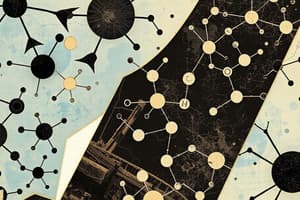Podcast
Questions and Answers
What is biochemistry the study of?
What is biochemistry the study of?
Chemical processes within and related to living organisms.
Which of the following is a component of the plasma membrane?
Which of the following is a component of the plasma membrane?
- Facilitates cell communication
- Controls the movement of substances (correct)
- Contains DNA
- Produces ATP
The cytoplasm is a jelly-like substance that fills the cell.
The cytoplasm is a jelly-like substance that fills the cell.
True (A)
What do microfilaments facilitate?
What do microfilaments facilitate?
What is the function of the mitochondria?
What is the function of the mitochondria?
The __________ houses DNA and is the site of transcription.
The __________ houses DNA and is the site of transcription.
Which type of cell lacks a nucleus?
Which type of cell lacks a nucleus?
What are lysosomes and peroxisomes responsible for?
What are lysosomes and peroxisomes responsible for?
Match the following organelles with their functions:
Match the following organelles with their functions:
What is the significance of biochemistry in disease development?
What is the significance of biochemistry in disease development?
Which of the following is NOT a function of cells?
Which of the following is NOT a function of cells?
Flashcards are hidden until you start studying
Study Notes
Biochemistry
- The study of the chemical processes within and relating to living organisms.
Plasma Membrane
- Phospholipids are a primary component of the plasma membrane.
Cytoplasm
- A gel-like substance that fills the cell.
- Contains organelles and other components.
Microfilaments
- Facilitate cellular movement, such as muscle contraction and cell division.
Mitochondria
- Powerhouse of the cell.
- Responsible for generating ATP (adenosine triphosphate), the primary energy currency of cells.
Nucleus
- The nucleus houses DNA and is the site of transcription.
Prokaryotic Cells
- Lack a nucleus.
Lysosomes and Peroxisomes
- Responsible for breaking down cellular waste and toxins.
- Lysosomes utilize enzymes to degrade waste products.
- Peroxisomes contain enzymes for oxidation reactions.
Organelles and Functions
- Nucleus: Contains DNA and is the site of transcription.
- Ribosomes: Sites of protein synthesis.
- Endoplasmic reticulum (ER): A network of membranes involved in protein and lipid synthesis.
- Golgi apparatus: Modifies, sorts, and packages proteins and lipids.
- Mitochondria: The powerhouse of the cell responsible for ATP production.
- Lysosomes: Digest cellular waste products.
- Peroxisomes: Contain enzymes for oxidation reactions.
- Vacuoles: Storage compartments for water, nutrients, and waste products.
Biochemistry and Disease
- Plays a crucial role in understanding disease development.
- Biochemical imbalances or malfunctions can lead to a wide range of diseases.
- Example: understanding metabolic pathways allows for the development of drugs to treat diseases like diabetes.
Cell Functions
- Growth and development: Cells enlarge and divide to maintain an organism's structure.
- Repair: Damaged cells are replaced by new cells.
- Energy production: Cells use energy to perform various functions.
- Waste removal: Cells eliminate waste products.
- Communication: Cells communicate with each other to coordinate activities.
- Reproduction: Cells divide to create new cells.
Studying That Suits You
Use AI to generate personalized quizzes and flashcards to suit your learning preferences.




